Women and climbers of colour have long known about climbing’s sexist and racist roots. Now, in the wake of broader social movements to rename landmarks and remove or rededicate historical monuments, some climbers’ efforts to change derogatory route names are finally paying off.
Please be advised that this story contains some racist and sexist language.
The Squamish Climbing Facebook group is a mainstay for anyone who climbs on the world-class crags about an hour’s drive north of Vancouver. On any day there will be a handful of posts asking for rope cleaning tips or if anyone found a pair of blue climbing shoes last night at the Smoke Bluffs.
The culture of rock climbing – a sport from which women were once excluded – reflects the sexism and racism of a male-dominated space unchecked by societal prerogatives towards inclusion. Whereas route names such as “Campus Slut” or “Sloppy Pussy” were once acceptable among the circle of mostly men, there are now plenty of women climbing these same routes, and regular posts in the Squamish Climbing Group want these names changed.
When I began researching this story, I posted in the group asking if anyone wanted to speak to me about how routes are named, and if any first ascenders had considered changing the names of their own routes.
The replies were astonishing.
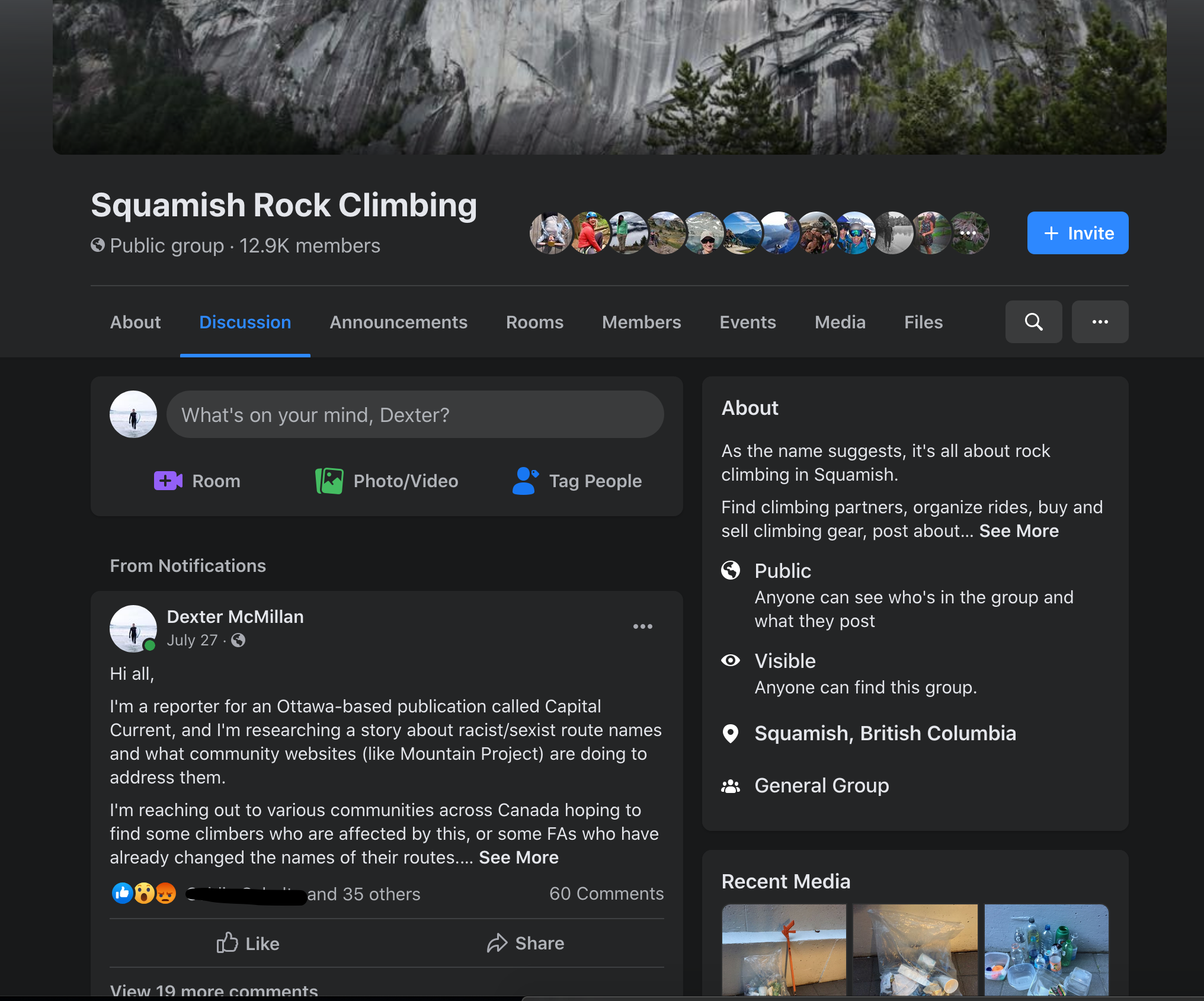
“What a waste of energy, and time,” wrote one man. Another put up a string of face palm emojis followed by another message: “Must everything be whitewashed?”
One man had written a letter to the editor of a rock climbing magazine. He sent me a draft copy of the letter, in which he named a half dozen routes that nobody has asked to be changed and pointing to the slippery slope on which he believes they sit.
“Renaming climbs to appease a few with fragile sensibilities is not a hill to die on, folks,” he concluded in the letter.
But more and more, for each voice insisting this isn’t a problem, there are plenty of others urging changes to the names of climbing routes across North America. After a broader reckoning with how we name landmarks or rethink monuments to problematic historical figures, change is coming to online and printed guidebooks — thanks in large part to women organizing and pushing for change, and the knock-on efforts of one of the largest climbing resources on the internet.
Capital Current scraped data from Mountain Project’s “offensive names” flagging system before the page listing all flagged names was removed by administrators. This list is based on Melissa Utomo’s original flagging system, which Mountain Project has been accused of stealing from Utomo, who was originally hired to build the system for them.
What’s in a route name?
The unwritten rule of building new routes for people to climb is that the first person who climbs it and prepares it for others to use gets to name the route. It’s a sacred principle of climbing culture, and choosing a name can be a sentimental task.
Christina Smyth understands the energy that goes into naming routes. She describes one that she and her husband are trying to name right now in Squamish. “The other route beside us right now is called PB and J,” said Smyth. They’re trying to decide whether “panini crack” or something about a clubhouse sandwich might describe the route well, while also fitting with the theme of the crag.
Smyth helps with route development in the area, and is one of a handful of women who develop routes across North America working to get certain ones renamed.
Their efforts are coming in a swirling environment of demands for change and resistance to that change.
In the United States, the killing of George Floyd by Minneapolis police in May 2020 ignited protests across that country. And the anti-racism movement swept across Canada, as well, focusing on the killing of Regis Korchinski-Paquet and Ejaz Choudry among others.
Recently, protesters in Montréal tore down a statue of Sir John A. Macdonald, the founding father of modern Canada but also an architect of the genocide of Indigenous people. Meanwhile, councillors in a township in Eastern Ontario named after early 19th-century slave owner and Upper Canada anti-abolitionist Peter Russell voted to rededicate their municipality’s name to a different Russell.
“We’re just doing something fun and recreational … we’re not out curing cancer.”
Aaron Kristiansen, route developer and climber in BC.
The names of geological features have been called into question, too. Earlier this year, an Indigenous lawyer took action to change the name of three peaks near Canmore, Alta., to pre-colonial names. Shortly after, a column in The Crag and Canyon newspaper called for the name of a peak using a racist term for Indigenous women to be changed.
Aaron Kristiansen has been a route developer in B.C. for more than two decades. He describes the process of climbing and cleaning routes as “a culmination of years of efforts and research.” He began in the Kootenay mountain region of the province in 2005, and would spend the next five years developing climbs in the Mount Gimli region. “I had a name (for a route) that I just dragged around with me for years,” he said — “Slave to Gravity.”
He says Mountain Project — an online database of climbs and a forum where climbers can post, rate and comment on climbs around the world — contacted him and his friend about changing the name of the route.
“My knee-jerk reaction was like, ‘No, that’s ridiculous. It’s nothing offensive.'” But Kristiansen had a change of heart. “I want people to go and climb that route and have as much of an adventure as me and my friend had.” He said after some more reading, he began to understand that the word slavery makes light of a very real and very dark chapter of North American and global history, and he said that ultimately, climbing is really a “trivial thing”.
“We’re just doing something fun and recreational,” he said. “We’re not out curing cancer.”
Male voices dominated climbing
Accountability is hard to assign when names are created by thousands of first ascenders across North America and published by guidebook authors with little authority over a community born to be skeptical of power. There is fierce opposition from mostly male climbers who are entrenched in rock climbing’s rebellious, anti-authority glory days.
In the 1950s and ’60s, advances in climbing technology opened up big wall climbing in California’s Yosemite National Park. Yosemite began to attract hundreds of climbers, many of whom would move to the park and climb full-time, rejecting societal pressures of the outside world. These climbers developed new styles of climbing that evolved rapidly. While early climbers would use climbing aids to improve upward mobility, sport climbing – climbing with protective gear that can be placed into permanent bolts that route developers put into the rock when they first climb a route – rapidly took off as the dominant style.
In the 1990s, sport climbing exploded from Yosemite into places like Smith Rock State Park in Oregon, and then quickly spread across North America. But women were notably a minority during this time, and as such, it was largely men who built and named the routes.
‘The public has never even really heard about climbing and if they did, they thought it was dangerous and crazy,” said Ken Chase, an Ontario climber who has been active in the sport since the mid-1990s. He was another of many to respond to my original Facebook post.
Today, climbing is no longer a fringe activity. The sport is set to be included in the Tokyo Olympics, currently postponed to the summer of 2021 by COVID-19. Annual reports by the Climbing Business Journal estimate that the number of climbing gyms in the U.S. has increased by about 10 per cent annually in each of the last two years. But as society moves to be more inclusive and less tolerant of racism and misogyny, many route names have endured, sheltered by what Chase calls climbing’s “punk rock attitude of rejecting social norms.”
Women are pushing for solutions
In the summer of 2019, Dr. Jen Wigglesworth, a then-PhD student at Queen’s University, published research on the prevalence and effect of offensive route names. Wigglesworth interviewed dozens of women who climb. They described a variety of experiences, and while some see the route names as light-hearted jokes, many women avoid routes altogether if they have an offensive name.
“There are so many people defending the names who are like, ‘Oh, I don’t find it offensive, and you’re just being too sensitive,’” said Jaylene Chung. She is part of a collective of climbers called Climb the Gap, which aims to increase the number of climbers of colour.
“There is a good deal of gaslighting,” she said.
The gaslighting that Chung refers to is prevalent in the Squamish Climbing Facebook group. Capital Current obtained transcripts of conversations between a group moderator and a group member, who was not named in the transcripts. The man is described as over 30 (“I have never needed to take a moderator action on a different demographic regarding this issue,” a group administrator told me) and was put on a short ban from posting to the group after a post of his was deleted.
The transcript follows:
You deleted it and suspended me because SOME people were offended. Many others liked and enjoyed my post and thought it sparked an interesting discussion.
Those who complained were threatened by my post because I exposed the utter silliness and hypocrisy of “woke” culture and their desire to control how others think and speak. They know that once we start censoring a route name because someone is “offended” that other names like “Dreamcatcher”, “Sloppy Poppy”, “Straight Outta Squampton” and others will become targets of censorship.
It’s a shame you, the other moderators, and some in the group fear vigorous debate. You’d think climbers wouldn’t be so frightened given the adversities we all face in climbing. But woke culture is so fragile.
And my post wasn’t “demeaning.” It was humor. Many got it.
This type of gaslighting – using unclear examples of problematic names and convincing others that they simply wish to have an “interesting discussion” – is common. Many arguments against changing specific names also rely on the dual meaning of words relating to the route: “Dyke” refers to a geological feature of rock, but is also a derogatory term used against lesbians, so route names like the Squamish route “Black Dyke” are protected by disingenuous arguments from climbers who say the route only refers to a rock formation.
Other arguments often boil down to “slippery slope” arguments — allowing changes to a few route names will lead to endless other demands — or the assertion that it is simply too difficult to change the names once they’re already printed in guidebooks.
Nevertheless, the work is being done.
Mountain Project, which had previously taken a laissez-faire approach to the issue of offensive names, rolled out a flagging system earlier this year in which users could note offensive route names. Administrators and volunteers began reaching out to first ascenders to change offensive route names, and immediately redacted names of those route names that site founder Nick Wilder says “clearly have no place on Mountain Project, or any climbing guide.” (Melissa Utomo, a web developer who built the technology to flag offensive route names for Mountain Project, accused the site of stealing her work after she approached them with the idea for the flagging system. Mountain Project has since removed the page listing offensive names. When contacted for comment on this, Wilder said the “the flagging system is still in place” even though the page listing all flagged routes is gone.)
“We do not want to perpetuate a world where these examples of oppression and violence exist.”
— Climb the Gap, on why the group is working to change derogatory route names.
Smyth said she appreciates that Mountain Project is making an effort to help address derogatory and racist names. “I think it shows leadership and courage as (the effort) is going to face a lot of backlash.” It was a prescient statement.
“Libtard cancel culture is shit,” read one response to the initiative shared in Climb Index!, a Facebook group for climbers in Washington State. “At least they can’t remove it from the guidebook!” read another. Yet another declares: “Welcome to the new fascism. Trial by Facebook,” while another jests that “(The route name) Thin Fingers is super offensive to my pudgy fingers, think about how my fingers feel . . . “
All but a handful of the 165 comments on the post — mostly disparaging the move by Mountain Project to bring progressive reforms to route-naming — were made by men.
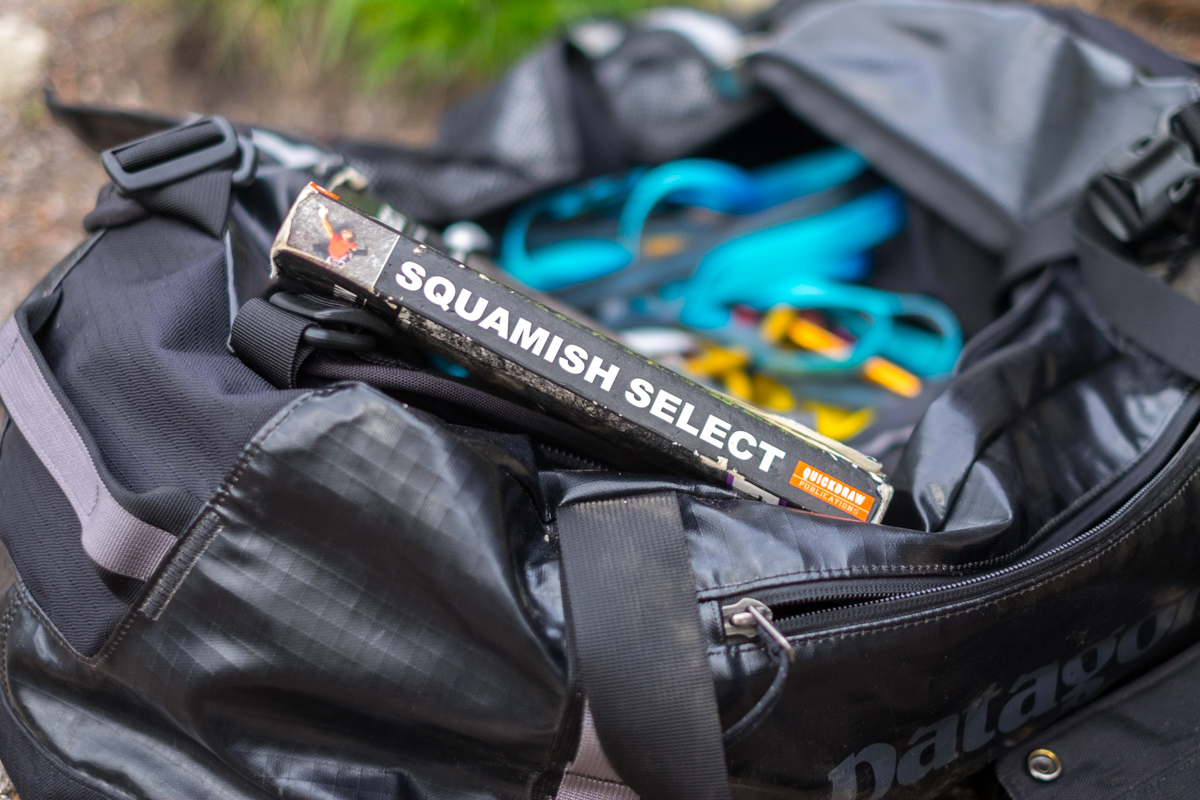

While online resources can be changed easily, guidebooks are another question entirely. At climbing crags, guidebooks are everywhere. Climbers rely on the books far more than online resources like Mountain Project, in part because you can take them into areas without cell reception to plan your climbs and get valuable information about what you’re climbing. It follows that guidebooks, then, have incredible power to perpetuate or erase derogatory route names.
Chung’s organization, Climb the Gap, launched an effort to identify offensive route names by asking volunteers to submit information about routes with derogatory names. The organization will then contact guidebook authors and ask them to address the names.
“While it may seem insignificant or innocuous, what we name these places has an impact on those who enjoy them, regardless of background,” reads the spreadsheet’s FAQ page. “And for those of us who are outdoor educators who bring young people outside – we do not want to perpetuate a world where these examples of oppression and violence exist.”
In Squamish, Christina Smyth is making a similar effort. Smyth is a teacher, and she’s used her unusually empty summer during the COVID-19 pandemic to address some of the most obviously offensive names in the Squamish guidebooks. Her process is similar to Chung’s: track questionable or outright offensive names in Squamish, then get in touch with guidebook authors and first ascenders to address the names. She’s contacted two guidebook authors in the Squamish region, and while she said they were amenable to change, there is some hesitation to get involved in changing names without the permission of first ascenders.
Other groups are working in regions across North America, and have had mixed success, according to Smyth. Some authors are hesitant to become arbiters of what’s acceptable. Others are keen to take action. “One guidebook author was weighing the cost of changing and reprinting all of the $80,000 US worth of guidebooks,” said Smyth.
She also said she has been in touch with the Squamish Access Society to help by forwarding complaints about route names to her and her team so they can follow up with guidebook authors. (The Squamish Access Society did not respond to requests for comment).
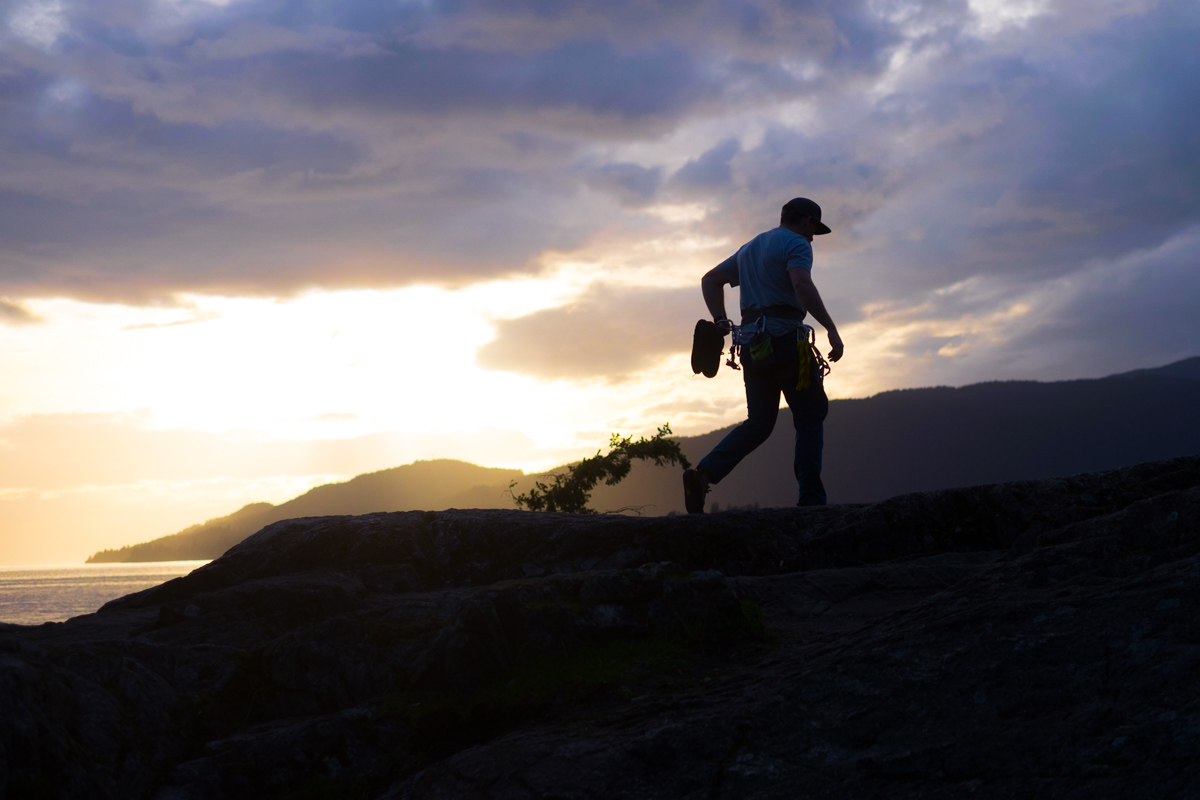

Two years ago, I stood at the top of my very first sport climb, body shaking and breath heavy. My climbing partner lowered me, and congratulations rang around the bottom of the Squamish crag as I sat down to process the accomplishment, all nerves and adrenaline. I asked what the name of the route was so I could bookmark it as my first lead climb. “Medusa’s Werewolf,” he replied. The power of that name seared it into my memory.
To say that the naming of climbs is meaningless ignores the experience of rock climbing. I wonder how I would have felt if the climb had been named “Teenage Girls Won’t Blow Gorbies” or “Nubile Woman” – both names of climbs located in the same region of the park where I had been climbing. How would I carry the memory of a name like that with me?
“These are a reminder that our society is kind of misogynistic,” said Smyth, “and climbing isn’t exempt from that.”
Update: This story was updated to reflect the fact that chat transcripts were provided to Capital Current without names attached.

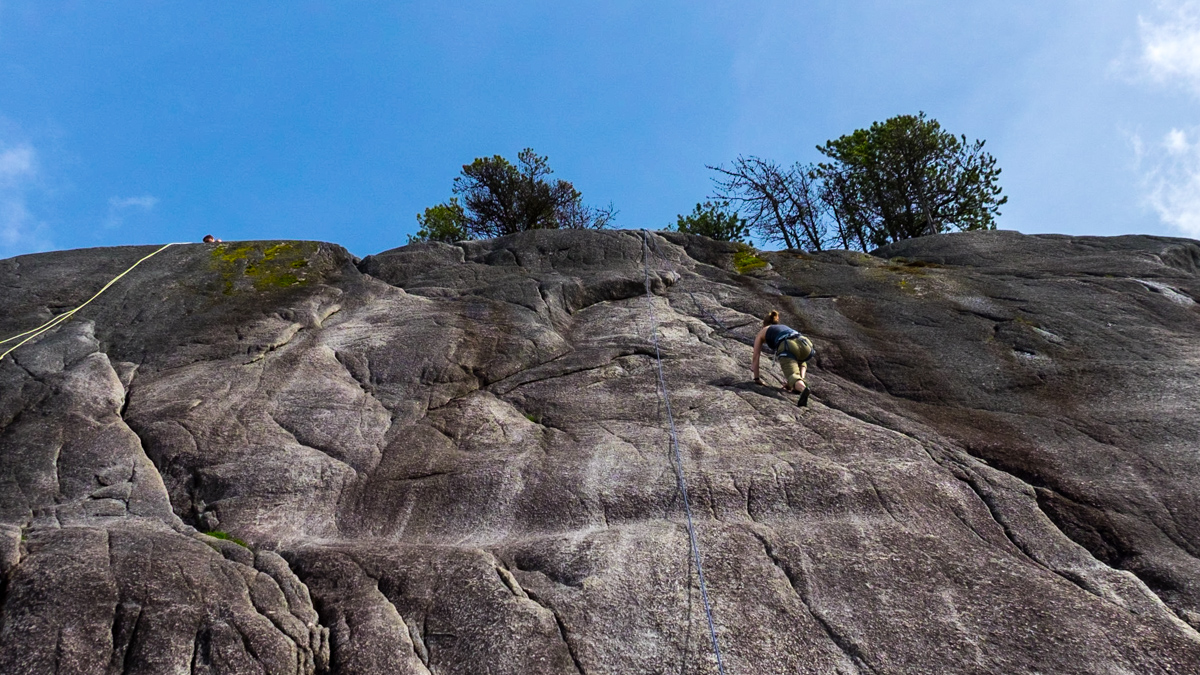



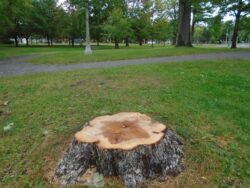
While I absolutely think some names would be better off changed, I also think it’s worth being careful to not erase the counter cultural roots of climbing. I feel there is something to be said for celebrating freedom of expression, as long as it doesn’t infringe on the freedom of other climbers to feel reasonably safe. Some flagged names are obviously offensive, but for others much less so. I have definitely climbed routes with names that have made me uncomfortable. However, I think the threshold probably needs to be higher than discomfort because a lot of things in the media make me uncomfortable but are considered perfectly acceptable, and are perhaps even necessary in a democratic society. Do we change the name of “Presidental P*ssygrabber” because it makes us uncomfortable, or allow it to remain because it allows someone to critique the state of our society? There may be no ideal answer here. I just think we should be judicious when we begin telling people how they can and can’t express themselves.
I think your comment is reasonable, if you add as an asterisk, that you are very rarely going to be the party attacked by these names. Consequently, your intuition on what is “too far” is going to be very poorly aligned with the actual truth of who is hurt, demeaned, or objectified by these names.
Aboriginal slur? Ask the First Nations community. Sexist name? What do women think. Gay slur? What does the LGBTQ community think. Misandrist slur? Now it’s in your wheelhouse to figure out how you as a man feel about being demeaned in this specific way and whether it’s within an acceptable framework or intended well-enough to not cause harm.
We’re in this together and we have to stick up for each other if we want everyone to feel safe.
Thanks for your thoughtful comment Kim. I think you make a great point, it makes sense to consult with the particular people being marginalized by a route name (Slhanay is a great example of preserving the original meaning of a name in a respectful way). And yes, people need to feel safe!
How you get a consensus from a marginalized group may be a bit more tricky. Personally, as a disabled person, I think how I feel about a route name that could affect me will depend on the context, and I would respond to it differently depending on whether it comes across to me more as a lighthearted joke or as a disparaging comment.
Hopefully route names can better respect people in the future, while still preserving some of the counter-cultural edginess that I think is a valuable part of the climbing world.